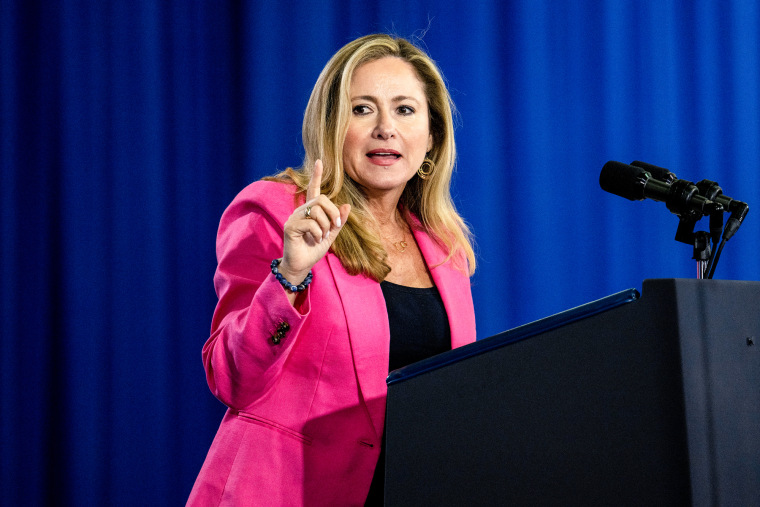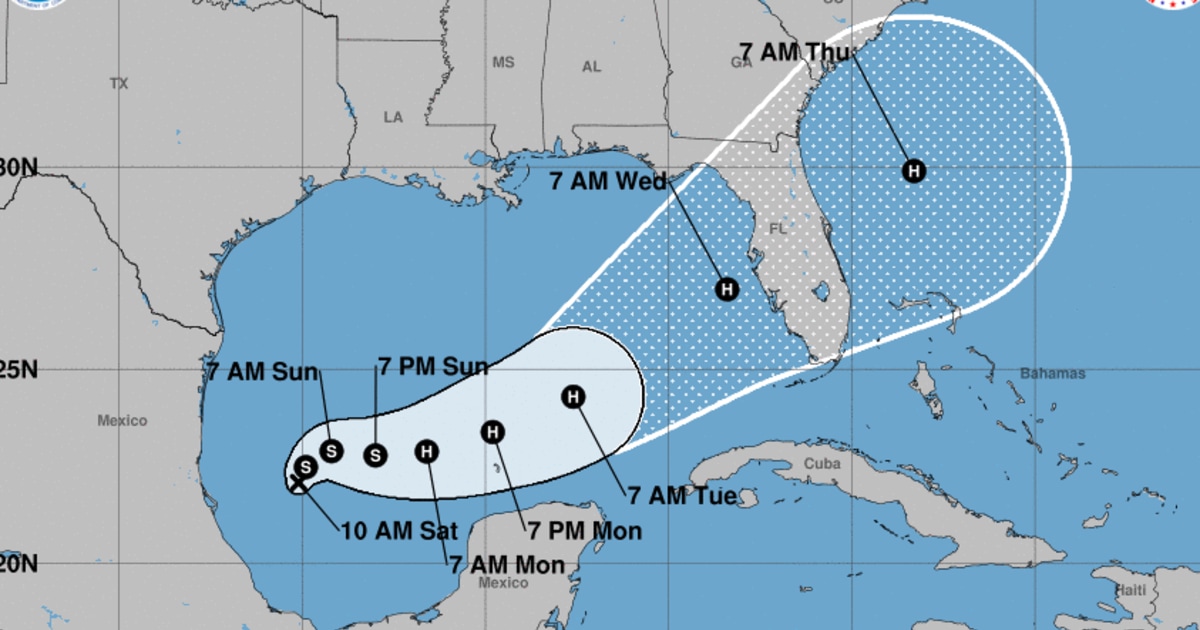PINECREST, Fla. — The only Latina vying for a U.S. Senate seat in November is trying to beat a Republican incumbent in an increasingly red state by stressing her moderate stance on many issues, including Latin America policy.
Former Rep. Debbie Mucarsel-Powell, a Democrat, says families across the state are struggling — and she knows from personal experience. Her mother lives with her and her 24-year-old daughter was also under the same roof until recently. All because housing has become so expensive in Florida, said Mucarsel-Powell.
She said those everyday struggles are what’s driving her to challenge Sen. Rick Scott, a well-funded Republican seeking his second term in a state that’s turned increasingly red in recent years.
Scott led Mucarsel-Powell by 4 points in a recent poll by the Public Opinion Research Lab at the University of North Florida, within the poll’s margin of error and consistent with other polls showing Scott with a single-digit lead. Still, it’s an uphill battle in a state where Republicans have dominated recent elections.
Early voting is underway for Florida’s Aug. 20 primaries, and Mucarsel-Powell and Scott face nominal competition for their party’s nominations.
Visiting a cafe in June in this upscale Miami-Dade suburb, Mucarsel-Powell described how she would help reduce the cost of living for Floridians, including working to lower prescription prices and property insurance rates, and pushing to expand solar panel use.
“Seniors have to go back to work because they can’t afford to pay for their property insurance rates, students can’t afford to have the education they want because of the cost of living,” she said.
Mucarsel-Powell, 53, who made history as the first Ecuadorian American and the first South American-born member of Congress, emigrated from Ecuador when she was 14. Her mother cleaned houses when she arrived, and Mucarsel-Powell said she helped her. Her father died in gun violence in Ecuador.
After one term in office, Mucarsel-Powell lost her seat to Republican Rep. Carlos Gimenez in 2020. She went on to join the gun violence prevention organization Giffords, founded by former Rep. Gabrielle Giffords, D-Ariz.
Currently, there has been only one Latina elected to the U.S. Senate: Democrat Catherine Cortez Masto of Nevada.
Mucarsel-Powell faces a tough race as the underdog, said Eduardo Gamarra, a political science professor and pollster at Florida International University.
Republicans have the majority in Florida in registered voters, Gamarra said. “So just on that alone you could say that Mucarsel-Powell’s battle is uphill,” he said.
Scott, 71, has significant name recognition in the state, having served eight years as governor. He won both of his governor’s races with less than 50% of the vote, and then barely registered a majority in winning election to the Senate in 2018 by about 10,000 votes. Scott is the wealthiest senator in office and has the ability to self-finance his campaign. He has loaned or given almost $14 million of his own money to his campaign through July. In 2018, Scott spent about $63 million to beat the Democratic incumbent, Bill Nelson.
Mucarsel-Powell, in her campaign events and Zoom calls, is billing herself as bipartisan, and GovTrack considers her voting record to be “purple,” meaning she has voted with Democrats and Republicans.
Scott’s campaign challenged that assessment.
“Debbie Mucarsel-Powell went to Congress for one term, voted 100% of the time with Nancy Pelosi, 94% with Ilhan Omar and 93% with AOC before the voters fired her,” Scott’s campaign spokesman, Will Hampson, wrote in an emailed statement. “She has been silent on our open border, big spending she voted for that has caused inflation crushing Floridians. … She is a socialist with nothing to run on, so she’s forced to lie about Rick Scott. It’s sad and Florida voters will reject her in November, if she wins her primary.”

For years, as part of their appeal to the large number of voters of Latin American backgrounds in the state, Republicans have accused state and national Democrats of being “socialists” akin to left-wing authoritarian leaders of countries like Venezuela and Cuba.
Mucarsel-Powell has pushed back against that label and distanced herself from some of President Joe Biden’s policies on Latin America. She said the administration should not have removed Cuba from the list of countries that do not cooperate fully against terrorism.
Florida, once a battleground state, has shifted more to the right in recent years. According to two recent polls, former President Donald Trump leads Vice President Kamala Harris by an average of 8.5 points in Florida, a state Trump won in 2020 by about 3%.
The November elections will be a test on where Florida Democrats stand after devastating losses in the midterm elections. Gov. Ron DeSantis won re-election in a landslide, becoming the first Republican governor to win heavily Hispanic Miami-Dade County since 2002. Republican Sen. Marco Rubio also won re-election in 2022 by more than 16%.
A focus on abortion rights
Mucarsel-Powell is making abortion rights a key issue in the race.
“It’s a health care issue. It’s a civil rights issue,” she said, adding that it’s a decision that should be made in privacy between a woman and her doctor.
Florida recently enacted a six-week abortion ban. Since nearby states have passed similar bans, the closest state that offers abortion beyond six weeks is North Carolina, where it’s legal up to 12 weeks. Virginia is the next closest state, and abortions are legal there up to 26 weeks. Scott has said he would support replacing the six-week ban with a 15-week ban.
Floridians will be able to vote in November on whether to enshrine abortion rights in the state’s constitution: The ballot measure seeks an amendment to bar restrictions on abortion before fetal viability, which is considered to be at about the 24th week of pregnancy. It would include exceptions past that point for “the patient’s health, as determined by the patient’s healthcare provider.”
In Florida, ballot measures need to reach 60% to pass, which means it needs support from both Democrats and Republicans. Some abortion rights advocates have pushed back on politicizing the issue.
“It’s not political. It shouldn’t be political. But there is one party that has been politicizing it by taking away that right and that freedom,” said Mucarsel-Powell, adding the six-week ban “happened at the state legislature with a supermajority, which is a Republican supermajority. That’s a fact. That’s not politicizing it.”
She also mentioned that Scott voted against a bill that would prohibit states from imposing restrictions on IVF treatments and their affordability, while releasing an ad in support of IVF. Scott responded to criticisms at the time by saying he supports a bill to strengthen state protections for IVF, not federal ones.
Vice President Kamala Harris, the Democratic presidential nominee, and her running mate, Minnesota Gov. Tim Walz, are vocal supporters of abortion rights and IVF and fertility treatment access and have made the issue a campaign priority.
According to Gamarra, the FIU professor, there is a general sense that Harris has had an impact on down ballot races across the country.
“That will give Mucarsel-Powell a boost,” he said. “But it’s not going to give her the boost that Democrats are really needing in a state which is so decisively Republican.”
Read the full article here


















